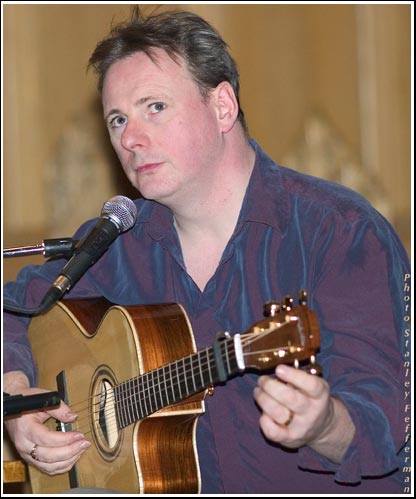|
Tony McManus does a lot of tuning onstage, but fortunately he is a very entertaining performer who can tell amusing and often, pointed stories, while strumming chords and twisting the pegs on his custom Christopher Melville guitars.
After playing three numbers without retuning, McManus introduced the question of tunings with this story, which is ‘freely’ reproduced here: “This is the first time tonight I’m going to a different tuning—it’s the DADGAD. I’m completely self-taught, but I went to a workshop once in Exeter given by John Renbourn. He introduced me to this DADGAD tuning. Renbourn told us it was good for all kinds of styles—Elizabethan, Irish harp, Scottish dance, Morris dance, but he said it was no good for Jazz. I went home and practiced this tuning for 12 hours, and he’s right.” McManus then seamlessly transitioned from the start-and-stop flow of retuning pitches into his beautiful arrangement of Charles Mingus’ lament for Lester Young, “Goodbye, Porkpie Hat.”
His recent album Ceol More is purely instrumental(*), but, it turns out, McManus sings to his own accompaniment, in a pleasant, wood grained voice, a varied repertoire, including Scottish ballads which he introduced with his familiar deprecating humour: “Scottish ballads all have 42 verses and the plot of all of them is ‘I met you once, and now you’re dead’.”
His vocals are as versatile as his playing. He sang, in a thick brogue a song, in praise of a place in Scotland (letting us in on the good news that he’s moved to Elora, just northwest of Toronto), and after another retuning, did an accent perfect American tune, “Hard Love:” (“The stuff that heals our lives is always hard love”). Retuning again, McManus told us about being at a gig in Belfast, and being conscious of the religious conflict there, he thought it would be appropriate to play something religious, so to be safe, he chose a Jewish hymn, “Shalom Aleichem,” which he proceeded to play with such strength and sensitivity that the hairs on my neck stood up.
When he plays adapted fiddle tunes such as reels, McManus really burns it with a display of prestidigitation as he executes hammer-ons, pull-offs and all the triplets that are typical of Scottish fiddle bowing. And, of course, there is the story: this one, of a reel he’s played in half a dozen Irish Counties where he’s reassured each time, that the reel in question is traditional to their particular area, and has been for centuries. Fact is, it was written in 1984, in Edinburgh by James Sutherland.
|
 |
As encore, McManus played the theme and a few of the variations on the traditional pibroch composition, “Lament for the Viscount Dundee,” which he introduced with a story about being at one of the recently fashionable American ‘Highland Games,’ this one in Alabama. A local, whose cracker accent McManus reproduced perfectly, questioned him about the origin of a particular tartan, and was told it belonged to the Clan McMuffin. Didn’t ring a bell. Was told they were a sub clan of the McDonalds. Didn’t ring a bell. What part of Scotland were these fellas from? The Isle of Egg.
He closed the evening with what sounded like a traditional bagpipe tune, stately and slow, with the baseline sounding like a drone, that somehow became “What a Wonderful World”, (Weiss and Thiele), and then faded back into the tradition.
|


